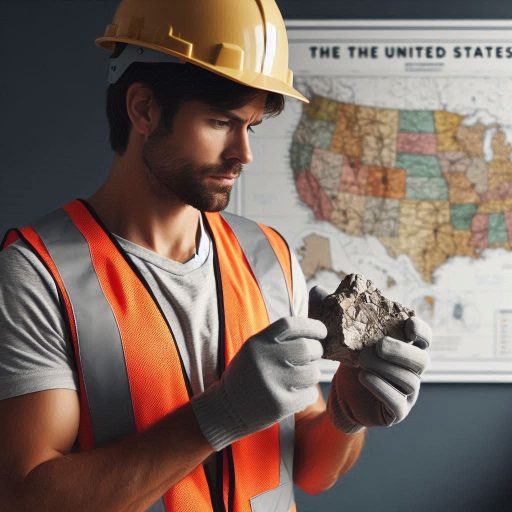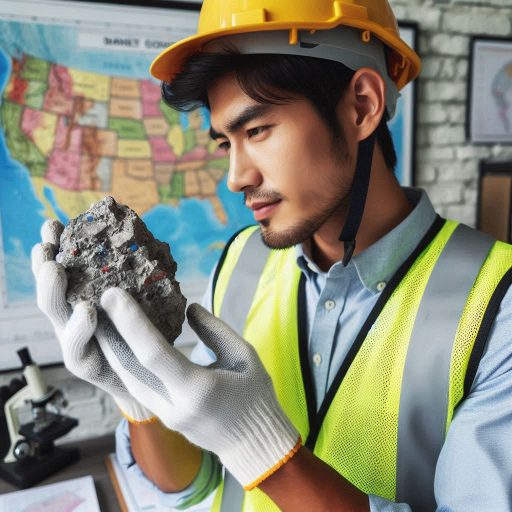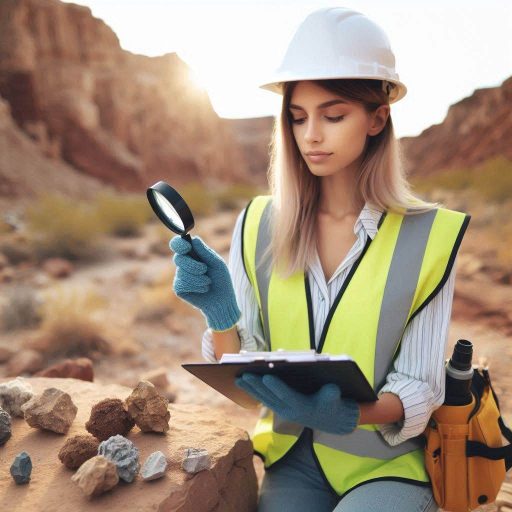Introduction
Attending geology conferences and events is crucial for professionals and students alike.
These gatherings provide opportunities to stay updated on the latest research and advancements.
Participants gain insights into emerging trends and technologies in geology.
Geology conferences cover a diverse range of topics.
Attendees can explore subjects such as mineral exploration, environmental geology, and geophysics.
Other themes may include paleontology, geochemistry, and climate change impacts.
This variety enriches the learning experience and allows attendees to tailor their interests.
Networking plays a significant role at these events.
Participants connect with industry experts, academics, and peers.
Building these relationships can lead to collaborations, mentorship, and job opportunities.
Conferences also facilitate discussions that may spark innovative ideas and research initiatives.
Additionally, conferences offer numerous learning opportunities.
Participants can attend workshops, presentations, and panel discussions led by leading experts.
These sessions often provide practical skills and knowledge applicable to real-world scenarios.
By attending geology conferences, you can enhance your expertise and broaden your professional horizons.
Embrace these opportunities to engage with the geology community, share your work, and learn from others.
Join us as we explore the top geology conferences and events to consider attending this year!
Overview of Top Geology Conferences
Prestigious and Well-Known Geology Conferences Around the World
Geology conferences provide excellent opportunities for networking, learning, and sharing research.
Here are some of the most prestigious and well-known geology conferences worldwide.
American Geophysical Union (AGU) Fall Meeting, Geological Society of America (GSA) Annual Meeting, European Geosciences Union (EGU) General Assembly, International Geological Congress (IGC) and Society of Exploration Geophysicists (SEG) Annual Meeting.
Specific Details Like Location, Date, and Main Focus of Each Conference
American Geophysical Union (AGU) Fall Meeting
The AGU Fall Meeting is one of the largest gatherings of geoscientists.
It occurs annually in December, usually in San Francisco, California.
The 2024 meeting will take place from December 9 to 13.
This conference focuses on a wide range of topics, including climate science, planetary science, and oceanography.
Geological Society of America (GSA) Annual Meeting
The GSA Annual Meeting is another prominent event in the geological community.
It typically takes place in October, with the 2024 meeting scheduled for October 20 to 23 in Denver, Colorado.
This conference covers various topics, including paleontology, sedimentology, and environmental geology.
European Geosciences Union (EGU) General Assembly
The EGU General Assembly occurs every April in Vienna, Austria.
The 2024 assembly is set for April 14 to 19.
This conference focuses on earth and space sciences, promoting interdisciplinary collaboration among scientists.
International Geological Congress (IGC)
The IGC is a major global event held every four years.
The 2024 IGC will take place from August 20 to 27 in Delhi, India.
The congress covers a wide range of geological topics, from mineral resources to environmental geology.
Society of Exploration Geophysicists (SEG) Annual Meeting
The SEG Annual Meeting is a leading event for geophysicists.
Scheduled for October 14 to 17, 2024, it will be held in San Antonio, Texas.
This conference focuses on exploration geophysics, including seismic methods, remote sensing, and geophysical technology.
Information on Registration Fees and Deadlines
Registration fees vary depending on the conference and participant status.
- For the AGU Fall Meeting, early registration costs around $500 for members and $700 for non-members.
The early registration deadline is typically in early November. - The GSA Annual Meeting charges approximately $350 for members and $450 for non-members, with early registration ending in late August.
- Registration for the EGU General Assembly ranges from ‘200 to ‘500. Early registration typically closes in mid-March.
- For the IGC, early bird registration is around $400 for members and $600 for non-members, with the early registration deadline usually in June.
- The SEG Annual Meeting has registration fees starting at approximately $500 for members and $700 for non-members.
The early registration deadline usually occurs in mid-September.
Attending these prestigious geology conferences can significantly enhance your knowledge and network.
Be sure to check registration fees and deadlines to make the most of these opportunities.
These events allow you to connect with fellow geologists and learn about the latest research in the field.
Read: Profiles in Success: Leading Chemists of the 21st Century in the US
Keynote Speakers and Presentations
The Importance of Keynote Speakers
Keynote speakers play a crucial role in geology conferences.
They set the tone for the event and provide valuable insights.
Their expertise helps attendees gain a deeper understanding of current trends and research.
Engaging presentations inspire participants to explore new ideas and approaches.
Attending a conference with renowned keynote speakers enhances the overall experience.
These experts often have years of experience and groundbreaking research.
Their perspectives shape discussions and encourage networking among attendees.
A strong keynote can spark interest and motivate participants to delve into specific topics.
Moreover, keynote speakers can bridge gaps between disciplines.
They often provide interdisciplinary insights, connecting geology with fields like environmental science and engineering.
This connection enriches conversations and fosters collaboration among diverse attendees.
Participants leave with new ideas and valuable knowledge, making keynote presentations essential.
Notable Speakers at Upcoming Conferences
Several notable speakers will present at upcoming geology conferences.
Dr. Jane Smith, a leading expert in sedimentology, will share her latest findings.
Her research on sediment transport mechanisms is groundbreaking and relevant to contemporary issues.
Dr. John Doe, a geophysicist, will discuss advancements in remote sensing technology.
His innovative techniques have revolutionized how geologists study subsurface structures.
Attendees can expect to learn about practical applications of these technologies.
Another influential speaker, Dr. Emily Johnson, specializes in paleoclimate research.
She will present on climate change’s impact on geological formations.
Her insights will help participants understand the interplay between geology and environmental changes.
These speakers represent a diverse range of expertise.
Their presentations cover various topics, ensuring attendees receive a well-rounded educational experience.
Topics Covered in Presentations
Conferences will feature a variety of topics in geology.
Key areas of focus include climate change, mineral resources, and tectonics.
Presentations on climate change will explore how geological processes interact with environmental shifts.
This topic is crucial for understanding the long-term impacts of human activity.
Another important subject is mineral resources and their sustainable management.
Experts will discuss responsible extraction and usage of minerals.
These discussions will address both economic and environmental considerations, highlighting the importance of sustainability in geology.
Tectonics will also be a prominent topic at many conferences.
Presentations will explore recent advancements in understanding plate movements and their impacts.
Attendees will learn about the latest research on earthquakes, volcanic activity, and mountain building.
Other presentations will cover emerging fields like geoinformatics and geochemistry.
These disciplines use modern technology to analyze geological data.
Attendees can expect to hear about innovative techniques and their applications in various geological contexts.
Attending geology conferences provides invaluable learning opportunities.
Keynote speakers offer unique insights and inspire participants.
Notable speakers and diverse topics ensure a rich educational experience.
By engaging with these experts, attendees can expand their knowledge and network within the geology community.
Participating in these events helps foster collaboration and innovation in the field.
Read: The Life and Times of a U.S. Physicist: A Day in Detail
Networking Opportunities
Benefits of Networking with Professionals in the Field
Networking at geology conferences offers numerous benefits.
Attendees connect with professionals who share similar interests and expertise.
Building these connections can lead to collaborative projects and research opportunities.
Networking also opens doors for mentorship and guidance from experienced geologists.
Additionally, meeting professionals from diverse backgrounds enriches knowledge and perspectives.
Participants learn about various geological fields, such as mineralogy, petrology, and geophysics.
This exposure helps attendees identify potential career paths and specializations within geology.
Networking can also lead to job opportunities.
Many companies recruit talent directly at conferences.
Attendees who network effectively increase their chances of landing internships or positions.
Engaging with professionals helps individuals stay informed about industry trends and advancements.
Ways to Connect with Others at Conferences
Conferences provide multiple avenues for attendees to connect with others.
One effective way is by participating in workshops and breakout sessions.
These smaller groups encourage discussion and collaboration among participants.
Another excellent opportunity arises during networking events.
Many conferences host informal gatherings where attendees can mingle and share experiences.
Taking advantage of these events is crucial for making meaningful connections.
Additionally, utilizing social media can enhance networking efforts.
Attendees can follow conference hashtags and engage with other participants online.
This strategy allows individuals to connect before, during, and after the event.
Lastly, don‘t hesitate to approach speakers and presenters.
Engaging with experts after their talks creates a chance for insightful conversations.
Asking questions or expressing interest in their work can lead to valuable connections.
Tips to Maximize Networking Opportunities
Maximizing networking opportunities requires a strategic approach.
First, come prepared with business cards to share contact information.
A well-designed card leaves a lasting impression and facilitates future connections.
Next, set specific goals for networking.
Identify the professionals or organizations you want to connect with.
Having clear objectives helps you stay focused during the conference.
During conversations, actively listen and engage with others.
Show genuine interest in their work and ask thoughtful questions.
This approach encourages meaningful discussions and builds rapport.
Additionally, follow up after the conference.
Send personalized emails to individuals you met, expressing gratitude for their time.
Remind them of your conversation and suggest future collaborations or meetings.
Finally, be open to unexpected connections.
Networking isn‘t just about meeting well-known professionals.
Engaging with fellow attendees can lead to surprising opportunities and insights.
Embrace every interaction as a chance to learn and grow.
In summary, attending geology conferences presents valuable networking opportunities.
By connecting with professionals, utilizing various strategies, and maximizing interactions, attendees can significantly enhance their careers.
Embracing the networking aspect of these events can lead to fruitful relationships and lasting benefits in the field of geology.
Read: Salary Ranges: What to Expect as a Physicist in the USA
Workshops and Field Trips
Workshops and Field Trips Offered at Geology Conferences
Attending geology conferences provides an excellent opportunity to expand your knowledge through workshops and field trips.
Many conferences feature hands-on workshops led by industry experts.
These sessions cover various topics, such as rock identification, mineral analysis, and geological mapping techniques.
Field trips are often integral to these conferences.
Participants explore local geological features while learning directly from professionals.
These trips allow attendees to visit unique sites, such as fossil beds, volcanic formations, or sedimentary layers.
Engaging with the environment enhances theoretical knowledge and provides practical applications.
Workshops might focus on using specialized tools, such as GPS devices or software for geological modeling.
Participants can also learn about environmental geology or sustainability practices.
Experts share their insights and experiences, making these sessions invaluable for attendees.
The Value of Hands-On Learning Experiences
Hands-on learning experiences significantly enhance the educational value of geology conferences.
By participating in workshops and field trips, you gain practical skills that are difficult to acquire through lectures alone.
Engaging with the materials, tools, and environments solidifies your understanding of geological concepts.
Field trips often include real-world case studies.
You can observe geological processes in action and understand their implications.
These experiences foster critical thinking and problem-solving skills.
Additionally, networking with professionals during these hands-on activities opens doors for future collaboration.
Moreover, experiential learning helps you retain information better.
By applying concepts in real-life situations, you develop a deeper connection to the material.
This method of learning also keeps participants engaged and motivated, making it a memorable experience.
Transform Your Career Today
Unlock a personalized career strategy that drives real results. Get tailored advice and a roadmap designed just for you.
Start NowHow to Sign Up for Workshops and Field Trips
Signing up for workshops and field trips at geology conferences is usually straightforward.
First, check the conference website for detailed information about additional events.
Most conferences provide schedules, descriptions, and fees associated with workshops and trips.
Registration typically occurs during the initial conference sign-up process.
You may have the option to choose specific workshops and trips that interest you.
Some conferences may require separate registration for these activities, so be sure to review the details carefully.
If you need assistance, contact the conference organizers via email or phone.
They can provide information on availability and help you navigate the sign-up process.
Some workshops and field trips may have limited space, so registering early is advisable.
In addition, many conferences offer discounted rates for students or early registrants.
Be on the lookout for promotional codes or special packages that bundle workshops and field trips together.
Remember to prepare for your chosen workshops and field trips.
Gather any necessary materials, such as safety gear or specific tools, and familiarize yourself with the topics beforehand.
By taking these steps, you will maximize your learning experience.
Attending geology conferences allows you to gain valuable knowledge and skills through workshops and field trips.
These hands-on experiences will enrich your understanding of geology and inspire your future endeavors in the field.
Read: Physics Specializations: Choosing Your Path in the U.S.

Sponsorship and Funding Options
Funding Options for Geology Conferences
Numerous funding options exist for individuals interested in attending geology conferences.
Many universities offer grants or stipends for students and faculty members.
These grants often cover registration fees, travel expenses, and accommodations.
It’s essential to check with your institution’s geology department for available funding opportunities.
Professional organizations also provide financial support for conference attendance.
Organizations like the Geological Society of America (GSA) and the American Geophysical Union (AGU) offer grants for members.
Applying for these grants often requires a short proposal or statement of intent.
Successful applications demonstrate the value of attending the conference for professional development.
Scholarships for Attendees
Several scholarships are specifically aimed at students and early-career professionals.
These scholarships can significantly reduce financial burdens.
For example, many conferences offer student scholarships that cover registration fees.
Some even include travel grants to assist with transportation costs.
Additionally, some organizations have dedicated funds for underrepresented groups in geology.
These scholarships promote diversity and inclusion within the field.
Potential applicants should carefully review eligibility criteria and application deadlines.
Preparing your application well in advance improves your chances of securing funding.
Corporate sponsorships often play a crucial role in funding geology conferences.
Major companies in the mining, energy, and environmental sectors frequently sponsor events.
These sponsorships can help cover venue costs, speaker fees, and other expenses.
Many companies also provide scholarships for students attending conferences.
Building connections with these companies can lead to additional funding opportunities.
Networking with industry professionals can yield valuable insights into available sponsorships and scholarships.
Resources for Securing Financial Assistance
Several resources can help attendees secure financial assistance for geology conferences.
The first step is researching available funding options online.
Websites for professional organizations often list grants, scholarships, and funding sources.
Networking within your academic community can also reveal hidden opportunities.
Professors and industry professionals may have knowledge of funding sources.
Additionally, joining professional organizations can provide access to exclusive funding opportunities.
Membership often includes newsletters that highlight new scholarships and grants.
Social media platforms, particularly LinkedIn, can be valuable resources.
Attendees can connect with past conference participants to gather insights on funding.
Engaging with the geology community online opens up opportunities for collaboration and assistance.
Funding attendance at geology conferences is possible with thorough research and proactive engagement.
Exploring grants, scholarships, and sponsorships makes attending these events feasible for students and professionals alike.
By utilizing available resources and networking within the geology community, attendees can secure financial assistance.
This support allows them to focus on enhancing their knowledge and building connections at these essential gatherings.
With careful planning, anyone can attend these conferences and reap the benefits they offer.
Find Out More: Space Scientists‘ Role in Space Mission Planning
Learn More: What Does a Paleontologist Do? Career Overview
Virtual Conference Options
The Rise of Virtual Conferences Due to COVID-19
The COVID-19 pandemic significantly impacted how conferences operate.
Many in-person geology conferences transitioned to virtual formats to ensure safety.
This shift allowed geologists from around the world to connect without geographical barriers.
Participants no longer needed to travel long distances to attend important events.
Virtual conferences became a convenient way to access valuable information and networking opportunities.
As a result, attendance rates surged as more people could join from home.
The flexibility of online platforms attracted a broader audience, including students and early-career professionals.
Benefits of Attending Conferences Online
Attending online geology conferences offers numerous benefits.
First, virtual conferences often reduce or eliminate registration fees.
This accessibility encourages more participants to engage in the latest geological research and discussions.
Second, attendees can access a wide range of sessions and topics.
Virtual formats often allow for a diverse selection of presentations and workshops.
Participants can choose sessions that align with their interests and career goals.
Third, online conferences facilitate networking opportunities through virtual meetups and chat rooms.
Attendees can connect with professionals in the field without the pressures of in-person interactions.
This format encourages discussions and collaborations that might not occur otherwise.
Additionally, many online conferences provide recorded sessions for later viewing.
Attendees can revisit presentations at their convenience, enhancing their learning experience.
How to Access Virtual Conferences and Participate in Discussions
Accessing virtual geology conferences is typically straightforward.
Most organizations provide detailed information on their websites.
Attendees can find registration links and conference schedules easily.
After registering, participants receive access instructions via email.
These instructions often include links to join sessions, discussion forums, and networking events.
Once logged in, participants can engage with speakers and fellow attendees.
Most platforms feature chat boxes for live discussions during presentations.
Participants can ask questions and share insights in real time.
Some conferences even offer dedicated discussion panels after presentations.
These panels allow attendees to delve deeper into specific topics and share their experiences.
Furthermore, many virtual conferences have social media components.
Attendees can follow event hashtags on platforms like Twitter and LinkedIn.
This engagement allows participants to connect with others, share key takeaways, and expand their professional networks.
The rise of virtual conferences has transformed the geology field.
These events provide accessible, flexible opportunities for learning and networking.
Attending online conferences enhances knowledge while fostering connections among geologists.
By leveraging virtual platforms, participants can maximize their conference experiences and contribute to ongoing discussions.
As the field of geology continues to evolve, staying informed through conferences remains vital.
Embracing virtual formats opens doors to a world of knowledge and collaboration, ensuring that geologists remain engaged and connected.
Find Out More: Day in the Life of a Professional Hydrologist
See Related Content: How Climatologists Influence Environmental Policies
Tips for Making the Most of Your Conference Experience
Preparing for Geology Conferences
Attending a geology conference requires thorough preparation.
Start by researching the conference schedule.
Know which sessions interest you the most.
Create a personal agenda to maximize your time.
Prioritize key presentations and workshops relevant to your work.
Don’t forget to register in advance to secure your spot.
Pack essentials ahead of time.
Bring plenty of business cards to exchange with new contacts.
A notebook or digital device helps you jot down notes during sessions.
Ensure you have comfortable shoes for walking between venues.
Dress appropriately for a professional setting, but also consider the event’s culture.
Engaging with Speakers and Attendees
Engagement is vital for a successful conference experience.
Approach speakers after their presentations.
Ask insightful questions to deepen your understanding of their work.
Be polite and respectful, as this can lead to fruitful discussions.
During networking events, introduce yourself to fellow attendees.
Start conversations with a friendly smile and a firm handshake.
Share your interests and ask others about theirs.
Finding common ground can create lasting connections.
Participate actively in workshops and panel discussions.
Share your insights and experiences, as this encourages collaboration.
Use social media platforms to connect with attendees before and during the event.
Follow the conference’s official hashtag to stay updated.
Leveraging Resources and Opportunities
Conferences offer numerous resources and opportunities for growth.
Explore the exhibit hall to discover new technologies and publications.
Engage with exhibitors, as they often provide valuable insights and networking opportunities.
Take advantage of workshops and breakout sessions.
These smaller groups allow for deeper discussions and hands-on learning.
Don‘t hesitate to ask questions or seek advice from experts.
Utilize online platforms provided by the conference.
Many events have dedicated apps for schedules and networking.
Connect with other participants through these platforms to build your network.
Schedule meetings with professionals you admire to learn from their experiences.
Make the most of any social events included in the agenda.
These informal settings encourage relationship-building in a relaxed atmosphere.
Use these opportunities to discuss your interests with others.
After the conference, follow up with new contacts.
Send personalized emails expressing appreciation for their insights.
Connecting on LinkedIn helps maintain relationships over time.
Sharing valuable resources or articles can foster ongoing discussions.
Conferences are a gateway to advancing your knowledge and professional network.
By preparing effectively, engaging with others, and leveraging available resources, you will maximize your experience.
Embrace every opportunity to learn and connect in the geology community.
Your proactive approach will lead to lasting benefits in your career.
Learn More: Essential Tools for Modern Data Science Workflows
Conclusion
Attending geology conferences is crucial for professional growth and networking.
These events offer opportunities to learn about the latest research and trends.
Participants can connect with experts, share ideas, and collaborate on projects.
Engaging with peers in the field fosters a sense of community and support.
I encourage you to start planning your attendance at upcoming geology conferences.
Check schedules for local and international events to find the best fit.
Many conferences offer workshops, presentations, and field trips, enriching your experience.
You‘ll gain valuable insights into current challenges and innovations in geology.
Lifelong learning is essential in the ever-evolving field of geology.
Staying updated on new techniques, technologies, and discoveries enhances your expertise.
Professional development allows you to adapt to changes in the industry and advance your career.
Participating in conferences also expands your network and opens doors for future opportunities.
You‘ll meet potential collaborators, mentors, and employers who can influence your career path.
Don‘t miss the chance to grow as a geologist! Attend conferences to deepen your knowledge and build lasting connections.
Start planning now, and prepare to embrace the vibrant world of geology.




